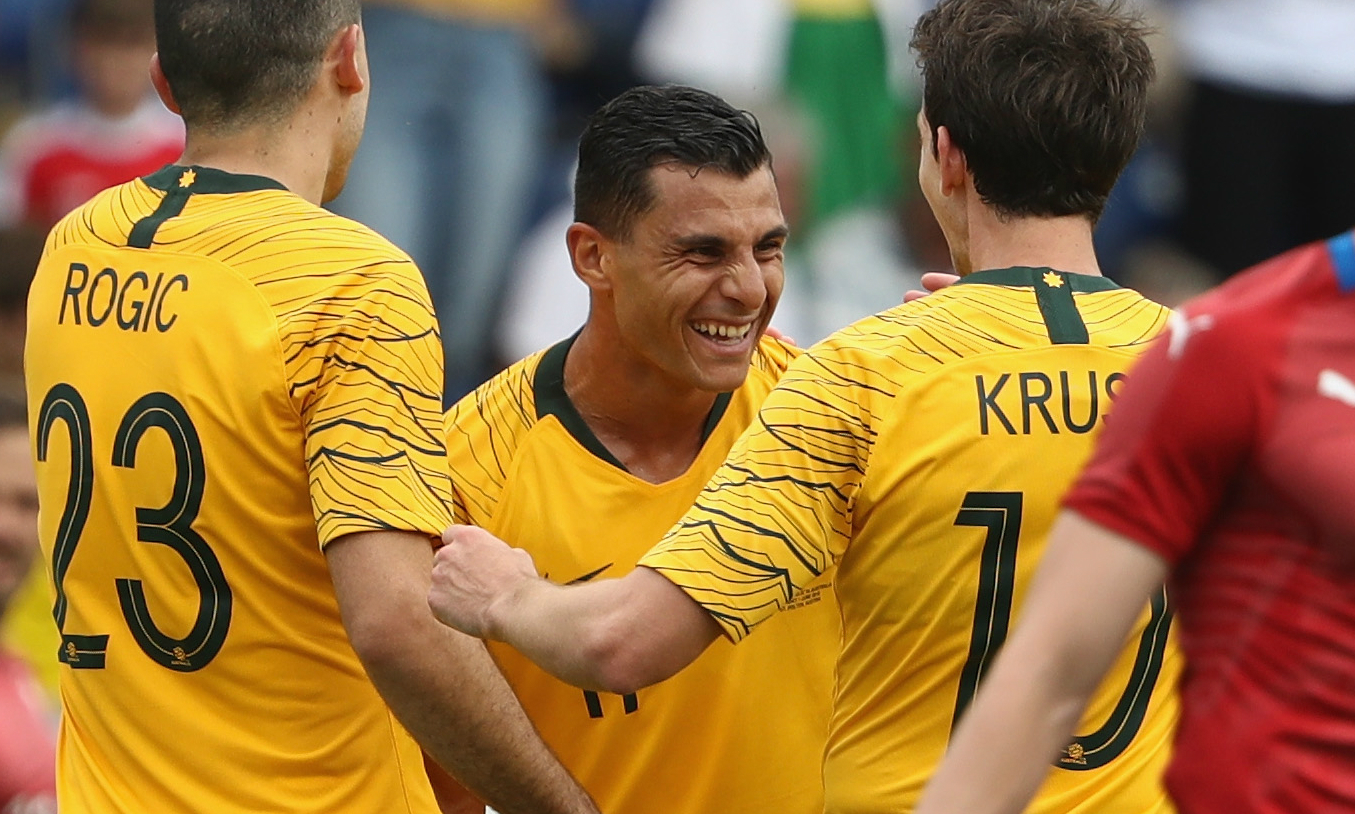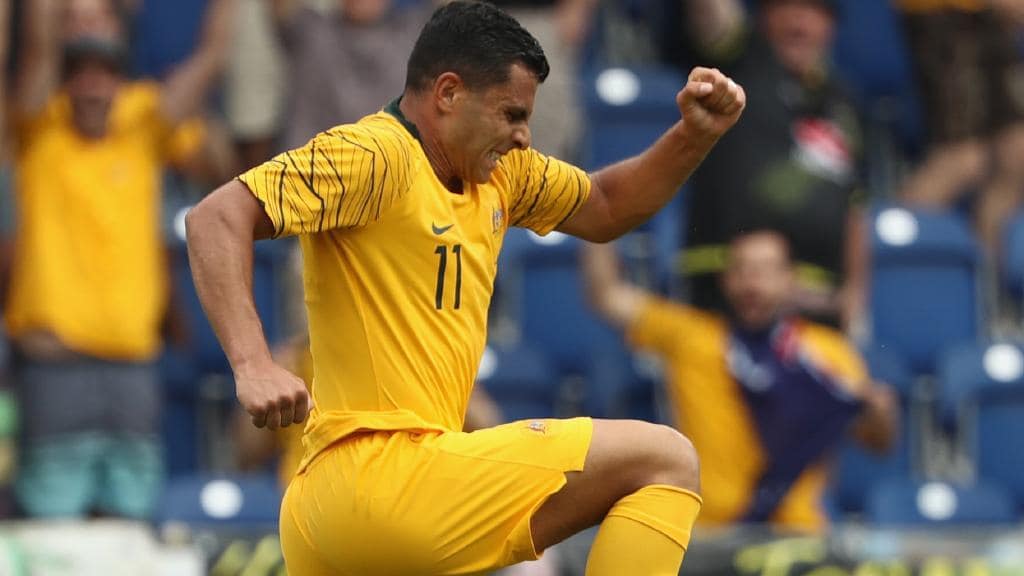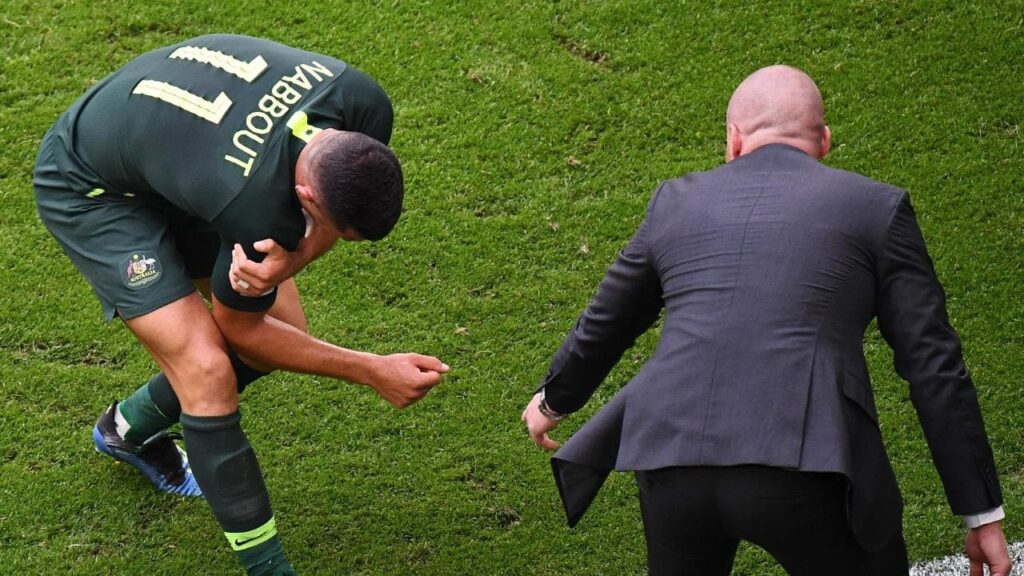
The rollercoaster of emotions a professional footballer can experience couldn’t be more simply encapsulated by Andrew Nabbout’s World Cup journey in Russia in June. One moment he experienced the euphoria of a first-ever World Cup. Shortly afterwards, he fell back down to earth. The former Newcastle Jets winger’s fairtale rise in the lead up to the tournament and eventual call-up to Bert van Marwijk’s final 23-man squad provided Nabbout’s career highlight. But in just the second Group match, he suffered a major injury, which led to a full shoulder reconstruction, prematurely ending his World Cup and providing a major career set-back. But Nabbout has made a miraculous recovery, and recently returned to action for Urawa Red Diamonds in the J-League, placing him firmly back in the frame for a return to the Socceroos – just in time for the team’s Asian Cup defence in January 2019…
Talk us through your feelings leading into the World Cup in Russia – from the moment you were selected in the preliminary squad and then made the final cut in the 23-man squad?
AN: Obviously being in camp with 27 players was always going to be tough because in the back of your mind you know four players still have to get dropped from the squad. So my mindset straight from the start was to do everything I could to stand out and be the best in my position. I knew it would be tough because there’s so many good attackers but thankfully it worked out and my hard work paid off. It was an amazing feeling to be named in the final 23 but I knew it was only the beginning. I said from the start, I don’t just want to be another number, I want to be a starter and I want to dominate.

Was that a dream come true to play for your country at the World Cup?
AN: To play for your country is a dream come true in itself. For any footballer, the ultimate goal is to be able to represent your country. But, to play for your country at a World Cup, is another level completely. It’s the biggest honour that a footballer can have. It’s something I can look back on in years to come and tell my kids and grandkids about.
Did that exceed your expectations?
AN: To be honest, when I first set my sights on the World Cup I imagined what it would be like but it was so much more when I got there. It definitely exceeded any expectations that I had.
What was it like playing against France in the first match?
AN: Playing against France was unreal! To share the pitch with the players they have was surreal. I soaked it all up in the warm up, but before the game I spoke to my wife and she said, “I know it’s a big game, it’s the World Cup and there’s a lot of pressure but don’t forget to just smile and enjoy it because it doesn’t come around every day”. So when I stepped out onto the pitch I had a smile on my face because I was so proud of my achievements up until that point. My focus was firmly on doing my job and putting in a good performance but it was about enjoying that job and performance. That’s how I play at my best, when I’m relaxed and enjoying it.
What were the expectations against Denmark?
AN: Playing against Denmark was a bit different because we weren’t as much of an underdog as we were against France so they knew what we were capable of, we just had to do it as best as we could. I thought we did great job in both those games, we executed our game plan really well. We were just unlucky not to score again.

When did you first realise you had sustained a serious injury?
AN: I knew straight away what had happened because it was the second time I dislocated my shoulder in the space of two months. It was a lot more painful than the first time because my shoulder wouldn’t go back in straight away so it was almost like I could feel my ligament tearing every second my shoulder was still out of place. Had I been able to get it back in right there on the pitch I would’ve stayed on for a bit longer because my shoulder was already strapped. So I was devastated to say the least.
Initially did you believe that you may be able to play on in the Peru match, given you had previously sustained the injury with Urawa and had recovered quickly?
AN: Initially I thought if I strap it heavily and play, there shouldn’t be a problem because the damage was already done, but then after having that chat with the medical staff it was a clear decision to stop. After the first time [Nabbout injured his shoulder] with Urawa, I didn’t leave the house. I iced my shoulder every hour and started rehab straight away, three times per day. I was determined to make it to the World Cup. But I had only damaged half the ligament which meant it wasn’t as risky to continue.
When did you realise you that your World Cup dream was over?
AN: I realised I was done after I sat down with the physios and the doctor and they explained to me that it’s too risky because my ligament was pretty much completely torn so any slight contact and it [his shoulder] would come out again. As much as it hurt me to admit it was over, I knew if I continued against their word it would be selfish from me to go out there in the condition I was in.
What was the reaction when you were told you would be out for around 6 months?
AN: After I spoke to the doctor and physios they told me it would be six months so I tried to get as many opinions as possible but it was all the same answer. Six months would be as long as it would take, so I was shattered but I knew that I always recover from injuries very quickly so this would be no different, as long as I did all the right things. Th Asian Cup has been a huge boost for me because it’s given me something to really work towards as well as returning for my club. I was determined to be in contention for Asian Cup so six months wasn’t an option for me.

How was the surgery initially?
AN: The surgery was fairly quick. I returned from the World Cup to Australia on the Friday. Monday I saw the surgeon and Tuesday I had the surgery so it was quite fast. After meeting with the surgeon, he told me it would take less time to recover if I did my rehab correctly.
Talk us through your rehabilitation program and how you progressed quicker than expected?
AN: For the first four weeks after the surgery I had to stay in a sling but was using my game ready ice machine almost every hour to make sure my ligament and surgery site healed properly. I started jogging and light band work straight away after 4 weeks. Even with a sling on, I was doing bike sessions to make sure I didn’t completely lose fitness. After 6 weeks I started doing more advanced rehab 3 times per day. From 6-12 weeks, I did as much rehab as I could and pushed as hard as I could without risking my shoulder. In that 6 weeks, I started doing a lot more conditioning work on the bike and on the pitch. Contact work started at 11 weeks to make sure I was okay with pushing, bumping and falling over again. At 11.5 weeks I began training fully with the team again. Initially I set a return date for the 7th of October but after being visited by Andrew Clarke from the national team, we determined that I was ready to go as soon as I felt confident enough. So I called the surgeon, he agreed and considering I’m a little bit crazy and I’m not scared to throw myself into challenges, I decided to make a return at the 13 week mark. I was fully confident and going into every challenge in training so I knew I was ready.
What was the feeling like returning to the J-League at the weekend?
AN: After returning for the game on the 30th I was really eager to get on the pitch but unfortunately there was a typhoon about to hit japan and there was heavy rain during the game so the coach made a decision to protect me in case of a bad fall. I joked and said it’s a good sign for me that he was more scared than I was. It meant that I had no fear whatsoever about playing, even in heavy rain. But I’m grateful to have a coach who put my health and well-being first.
Good to be back! We keep fighting @REDSOFFICIAL pic.twitter.com/WTbfBfzblJ
— Andrew Nabbout (@andrewnabbout) October 7, 2018
What are your aims for the next period?
AN: My aim is to get as much game time as possible before the Asian Cup. I need to be as fit as I was during the world cup to even be in with a chance so I’m working double time at training to make up for lost time. I need to be in excellent condition by the end of the Japanese season. I’m just aiming to play as much as I can and help Urawa win as many games as possible, and if I get the honour to be a part of the November Socceroos camp I’m going to give everything as I usually do, to prove that I’m ready.
Is there anyone you would like to thank?
AN: There are many people I’d like to thank because I had a lot of support through this rehab time. Obviously my wife who had to put up with staying at home and watching me do rehab for a few months. My family is always supportive and pushing me to be better. My agent, Tony Rallis who was constantly on the phone to me making sure I had everything I needed and to make sure my head was in the right space all the time. Nino La-Scala (national team physio), James Telford (Heidelberg United Physio) and Justin Doherty (Melbourne Victory Physio) for all of their help and guidance. Also, the national team staff, Phil Coles, Andrew Clarke and of course Graham Arnold who were all constantly on the phone to me, checking to make sure I had everything I needed and to make sure we were all on the same page in terms of my progress. Last but not least, Urawa Reds for absolutely everything. The coaches, medical staff and administration did everything I asked for and more to make my rehab as smooth and as quick as possible.








